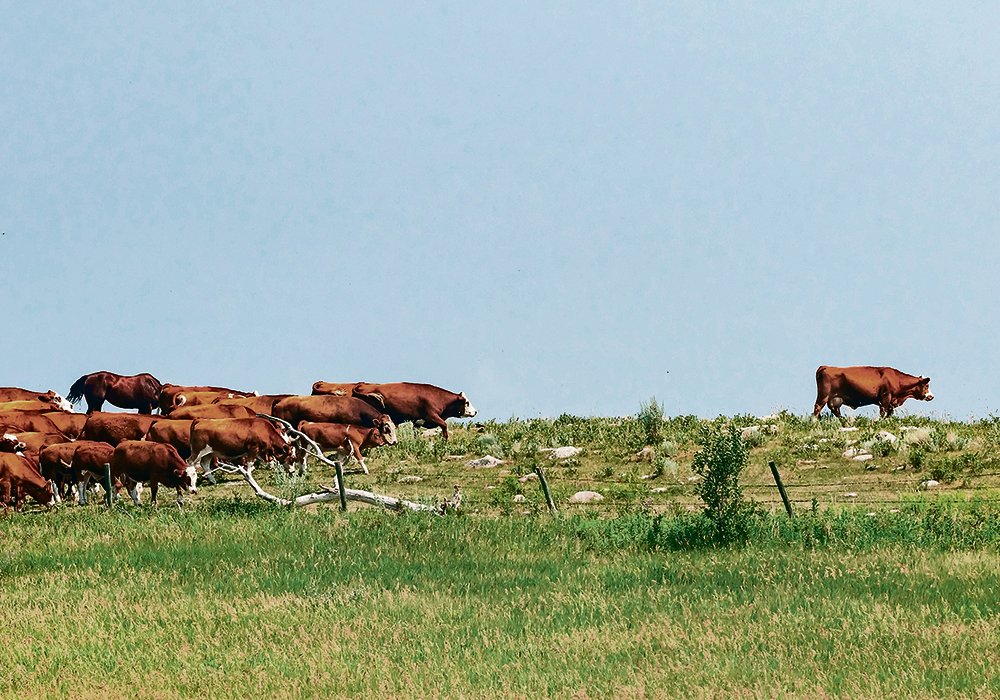Drought may significantly slash western herd

Some farm leaders are talking about the possibility of a 50 percent reduction across whole regions of Western Canada
The Canadian cattle herd is likely to shrink significantly as a lack of feed and water forces producers to sell off breeding stock.
During a town hall meeting organized by the Canadian Cattlemen’s Association and provincial associations July 19, leaders said cows are already moving to market as producers evaluate how many they can maintain on depleted pastures and with poor hay yields across the Prairies and northwestern Ontario. In British Columbia, fires have hit the main hay producing areas.
“It’s a massive, massive problem,” said CCA president Bob Lowe.
CCA is advocating for governments to move on several fronts, including allowing insured crops to be put to alternative use without affecting a farmers’ long-term yield calculation, allocating additional resources for water quality and access, declaring the B.C. fires eligible for disaster financial assistance, initiating relief under AgriRecovery, and immediate implementation of livestock tax deferral provisions for all classes of cattle in all affected areas and for a period longer than one year.
“This request is very urgent given the closing window available to salvage crops for feed,” Brady Stadnicki, CCA’s policy and program manager, said about changes to crop insurance.
Initiating drought relief under AgriRecovery is essential to maintain the national cattle herd, he said.
CCA has recommended a program similar to past iterations based on a feed-need design to provide direct support for extra feed and water costs on a per-animal-per-day basis.
The details are in the hands of government officials tasked with working out the drought relief program.
“We’re a very resilient industry but we need to ask for some help,” said Alberta Beef Producers chair Dr. Melanie Wowk.
She said she is most concerned about feed produced in southern Alberta going to the United States because producers there have a transport subsidy, while grain producers who are locked into contracts are unable to convert their crop for cattle feed.
“That’s what’s making my stomach clench today,” she said after the town hall meeting.
“We can ask for a feed-need model, but where do we get the feed?”
She couldn’t say how much of the Alberta cow herd might be slaughtered but said on her own family’s operation they are considering a 33 percent cut.
Manitoba Beef Producers president Tyler Fulton said the reduction will vary from region to region.
“In the Interlake region of Manitoba … I’ve talked to several guys that say their production is down to less than 10 percent and it’s just not feasible for them to be bringing in feed ingredients to support that. I don’t think it’s out of the question at all, across whole regions, to be looking at in excess of 50 percent of the herd lost,” he said, adding that a feed assistance program isn’t going to solve everyone’s problems.
Arnold Balicki, chair of the Saskatchewan Cattlemen’s Association, said stockyards that aren’t typically open in summer are holding sales and the number he has heard in that province is a reduction of more than 40 percent.
“It’s going to be a huge impact in years to come,” he said.
Many older producers who reduce or sell off entire herds won’t come back to the industry, he said, and the implications will be far-reaching.
In the short term, consumers may benefit from some lower prices as a glut of beef hits the retail counter, but after that food availability and security will be affected, he said.
Meanwhile in B.C., the general manager of the B.C. Cattlemen’s Association, Kevin Boon, said hay production was already down because of a dry, hot spring and fires that started a month earlier than usual have destroyed 680,000 acres, mostly in prime grass land.
Feed shortages will be severe and producers are looking at the possibility of getting hay from the lower mainland.
“Our biggest concern is going to be can we save the mother cow herd and our base herd here and carry on,” Boon said.
Source: www.producer.com

